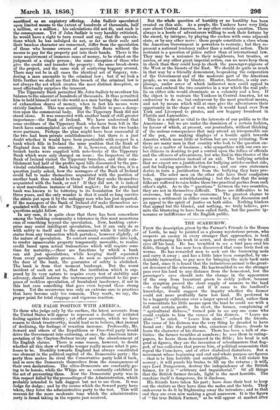OUR FALSE POSITION WITH AMERICA.
To those who judge only by the surface, the latest accounts from the United States will appear to represent a decline of irritated feeling against this country ; yet other accounts, which we have reason to think trustworthy, would lead us to believe, that instead of declining, the feelings of vexation increase. Professedly, Mr. Seward and others of the Republican or Free-Soil party would drive the Government into enforcing, at once, the American inter- pretation of the Clayton-Bulwer treaty and the abandonment of the English claims. There is some reason, however, to doubt whether all this show of warlike temper really means what it pro- fesses to be. Hostility towards England has always constituted one element in the political capital of the Democratic party ; the party thus makes its rival the Conservative party hold it back, and so save the Democrats themselves from the consequences of their own declarations. The ultra-Democrats are constantly go- ing to be heroic, while the Whigs are as constantly exhibited in the act of preventing them. Now the Democratic party was in this respect foiled by the proceedings of the Administration, which probably intended to talk daggers but not to use them. It was dodge for dodge ; and by the course which the Seward party have taken, they force the administrative party to the test. This will account for the more moderate tone which the administrative party is found taking in the reports just received. But the whole question of hostility or no hostility has been created on this aide. As a people, the Yankees have very little care about Central America, or any other outside question. There always is a horde of adventurers willing to seek their fortune by the sword, by intrigue, by playing the cuckoo with some adjacent state, or by any other move : these people constitute a class whom the American Government is powerless to restrain ; but they re- present a national tendency rather than a national action. Their restraint is a question of police rather than of international law. They may be a nuisance to their neighbours, but treaties or navies, or any other great imperial action, can no more keep them in check than they could keep in cheek the passenger-pigeons of the West or the locusts of the East. We should do quite as much in that way by a friendly demeanour, bespeaking the cooperation of the Government and of the moderate part of the American people, 118 we can do by bluster. Bluster, therefore, is only sur- plusage, under cover of which indisereet men could appeal to blows and embroil the two countries in a war which the real pub- lic on either side would abominate as a calamity and a loss. If the object is to restrain the Yankees iu Central America, let us endeavour to do so, but endeavour by the most practical means, and not by means which will at once give the adventurers their opportunity in the shape of war, while it would hand over New York and Liverpool to pirates, and sow beggary broadcast in Florida and Lancashire.
This is a subject as vital to the interests of our public as to the Americans ; but we are under the dominion of a certain fashion, by favour of which, at present, our journalists, without thinking of the serious consequences that may attend an irresponsible use of the pen, are making displays of a hostile spirit towards America which mean little at bottom but are very irritating. Now there are many men in that country who look to the question en- tirely as a matter of business ; who sympathize with our own so- ber citizens in desiring to put a control upon the follies of officials and the offences of adventurers, but who find. in this bluster of the press a counteraction instead of an aid. The bullying articles that we export are a justification for bullying articles onthat side, and for bullying speeches in Congress • and our own statesmen derive in turn a Justification from the bullying they have pro- voked. The sober men on the other side have their coadjutors here, appearances notwithstanding • but the dust that the noisy folks are suffered to raise hides those notwithstanding; practical parties from each other's sight. As to the " questions " between the two countries'
s
they are not in themselves difficult. There are difficulties to Ix overcome, but they may be overcome. The greatest chance to procure a settlement in either case would be a fair discussion and an appeal to the spirit of justice on both sides. Nothing hinders- that appeal but the bluster, and nothing' we truly believe, per mite the blustering to have been called forth, but the passive ig• norance or indifference of the English public.


























 Previous page
Previous page